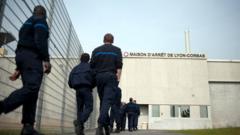Investigators found that fuel to both engines of Air India Flight 171 was cut off shortly after takeoff, raising questions about the pilots’ decisions. The plane crashed into a medical college, resulting in one of India's deadliest aviation disasters.**
Tragic Aviation Incident in India: Investigation Reveals Fuel Cut-off Before Crash**

Tragic Aviation Incident in India: Investigation Reveals Fuel Cut-off Before Crash**
A preliminary report into the Air India Flight 171 tragedy raises concerns over pilot actions leading to the crash that resulted in over 270 casualties.**
Seconds after takeoff from Ahmedabad on June 12, the Boeing 787 Dreamliner, Air India Flight 171, tragically crashed, killing all but one of the 242 passengers on board and dozens of individuals on the ground. A preliminary investigation report has revealed critical information from the aircraft's voice and data recorder, indicating that the fuel was cut off to both engines moments before the disaster, eliminating mechanical failure or design flaws as potential causes.
The findings have triggered a closer examination of the pilots' responsibilities during the flight. The report includes a conversation between the pilots, where one questioned the other about the fuel cut-off, to which the other pilot replied that he had not done so. This exchange poses significant questions regarding cockpit protocol and decision-making processes.
The flight was captained by seasoned pilot Sumeet Sabharwal, who has over 10,000 hours of flying experience, while First Officer Clive Kunder had an additional 3,400 hours. These figures depict a combined proficiency that, until recently, was undervalued in earlier computations of their experience.
As investigations continue, this incident is already marked as India's most severe aviation disaster since 1996, emphasizing the critical need for thorough oversight in both training and mechanisms within the cockpit to prevent such tragedies from recurring.






















